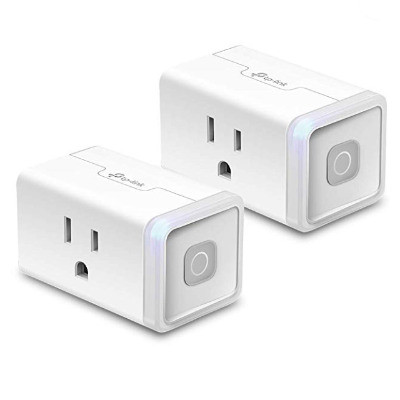TP-Link cancels HomeKit plan for Kasa smart plug mini
Following previous pledges to support HomeKit in its Kasa range, TP-Link has now revealed that its popular accessory will not be updated to work with Apple's system.

TP-Link's Kasa Smart Plug Mini
Electronics manufacturer TP-Link will no longer bring HomeKit support to its Kasa Smart Plug Mini. Previously, the company had promised support when unveiling the range at CES in January 2019. At the same time, the company had also claimed that existing devices would be updated to work with HomeKit early in the year. However, following months of delays, TP-Link has now cancelled plans to support Apple's system.
The news has not been formally announced, but rather was spotted by a Reddit user in a company support FAQ document.
"Due to changes in our roadmap, the Kasa Smart Plug Mini (HS105) smart plug will not offer support for Apple HomeKit," says TP-Link's document.
"Despite the change in direction for this specific SKU," it continues, "our team is committed to the development of innovative smart home solutions that will continue to delight our customers around the globe."
The Kasa Smart Plug Mini was going to be a significant boost to HomeKit because of the company's deals with Amazon. The retailer periodically offered the plug for only $15 when bought with an Echo speaker, so Amazon's rival system would actually have brought HomeKit into more homes.
It's not known yet whether the company is abandoning HomeKit for all devices or solely for this one product. Nor are there any details about whether there will be any recourse for customers who bought the Kasa Smart Plug Mini in the expectation that HomeKit was coming.
AppleInsider has reached out to TP-Link for more details.

TP-Link's Kasa Smart Plug Mini
Electronics manufacturer TP-Link will no longer bring HomeKit support to its Kasa Smart Plug Mini. Previously, the company had promised support when unveiling the range at CES in January 2019. At the same time, the company had also claimed that existing devices would be updated to work with HomeKit early in the year. However, following months of delays, TP-Link has now cancelled plans to support Apple's system.
The news has not been formally announced, but rather was spotted by a Reddit user in a company support FAQ document.
"Due to changes in our roadmap, the Kasa Smart Plug Mini (HS105) smart plug will not offer support for Apple HomeKit," says TP-Link's document.
"Despite the change in direction for this specific SKU," it continues, "our team is committed to the development of innovative smart home solutions that will continue to delight our customers around the globe."
The Kasa Smart Plug Mini was going to be a significant boost to HomeKit because of the company's deals with Amazon. The retailer periodically offered the plug for only $15 when bought with an Echo speaker, so Amazon's rival system would actually have brought HomeKit into more homes.
It's not known yet whether the company is abandoning HomeKit for all devices or solely for this one product. Nor are there any details about whether there will be any recourse for customers who bought the Kasa Smart Plug Mini in the expectation that HomeKit was coming.
AppleInsider has reached out to TP-Link for more details.

Comments
At this stage it’s fair to label such companies as frauds, because there have been enough companies that had struggled or scaled back their HomeKit intentions to give pause to anyone that wants to legitimately launch such a feature.
They are only 2.4Ghz and for some reason, the option for 'remote' control was dropped from the app so I think that feature is permanently 'on' now.
Overall, they have worked well but I have had to re-pair a couple of the plugs.
Of course, the real issue is how long they will be supported because without the app the whole set-up will fail and if they get hacked or suffer some kind of major outage it might be a major inconvenience.
Legal Definition of false advertising
So no, the statement you’ve made about a company switching plans due to poor sales or otherwise is not a legitimate defence against false advertising claims. I.E. It is fraudulent behaviour and so it is merely a matter of those at a loss to take action.
Lots of stuff that supports Google and Amazon, but not HomeKit or not fully or whatever. With Apple’s financial and engineering resources this simply should not be the case.
Good to know. Want as less Chinese electronic products in my home as possible. You never know..
I got nailed on that a few months back: I bought 2 identical LifX bulbs from Best Buy but one turned out to be an earlier release that did not have the Homekit code -- so it could not be connected to HomeKit. (I saw something from LifX about connecting it their app to get the code, but that defeats the purpose: I didn't want to connect it to anything but HomeKit.) I returned it to BestBuy and they were perplexed: EVERYTHING about the 2 bulbs (Product Numbers, etc.) were identical -- but one was just from an earlier non-HomeKit compatible release.